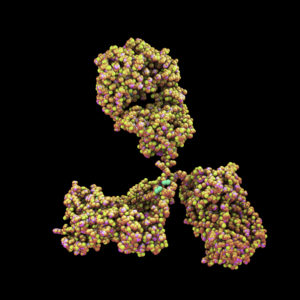Human Papillomavirus
Human papillomaviruses (HPVs) are globally widespread and are tropic for epithelial cells. Different HPVs display a preference for distinct sites of the body, infecting either cutaneous or mucous membranes. Most HPV infections are asymptomatic or give rise to benign warts.
However, a large subset of HPVs, referred to as high-risk genotypes, can cause infectious lesions that may lead to premalignant and malignant cancers of the genital tract. At least thirteen HPVs are recognised as high-risk genotypes that have been associated with malignant disease.
At the Native Antigen Company, we offer a range of monoclonal antibodies recognising Human Papillomavirus (HPV) genotypes for immunoassay research and development. The range includes matched capture-detection antibody pairs for use in sandwich immunoassays and western blotting.
Human Papillomavirus Background
Human papillomaviruses (HPV) are small, non-enveloped, DNA viruses that belong to the family Papillomaviridae. Over 150 genotypes have been identified to date. which are divided into 5 genera, based on DNA sequencing.
Human papillomaviruses (HPVs) are globally widespread and are tropic for epithelial cells. Different HPVs display a preference for distinct sites of the body, infecting either cutaneous or mucous membranes. Most infections, caused by HPVs, are asymptomatic or cause benign warts. Some HPVs cause latent infection which can be re-activated under certain circumstances, such as stress and immunosuppression (McMurray, HR).
However, a large subset of high-risk HPV genotypes can cause infectious lesions that may lead to premalignant and malignant cancers of the genital tract. At least thirteen HPVs are recognised as high-risk genotypes causing malignant disease. The most common high-risk genotypes are HPV 16 and 18, which are frequently associated with cancer of the cervix (Doorbar, J). Transmission of high-risk HPV genotypes occurs via skin-to-skin contact during sexual activity.
In recent years, a successful vaccine has been developed that protects against four HPV strains 6, 11, 16 and 18. Clinical trials suggest that the vaccine prevents pre-cancer caused by HPV 16 and 18 in 99% of cases in young women (WHO).
References
McMurray HR, Nguyen D, Westbrook TF, McAnce DJ. 2001. Biology of human papillomaviruses. Int J Exp Pathol. 2001 Feb;82(1):15-33. Review.
Doorbar J, Egawa N, Griffin H, Kranjec C, Murakami I. Human papillomavirus molecular biology and disease association. 2015. Rev Med Virol. Mar;25 Suppl 1:2-23.
World health organization: Biologicals, Human Papillomavirus
Human Papillomavirus Antibodies
A range of monoclonal antibodies recognising Human Papillomavirus (HPV) genotypes are available for immunoassay research and development. The range includes matched capture-detection antibody pairs for HPV16 and HPV18. These antibodies are suitable for use in sandwich immunoassays and western blotting.
Questions?
Check out our FAQ section for answers to the most frequently asked questions about our website and company.


